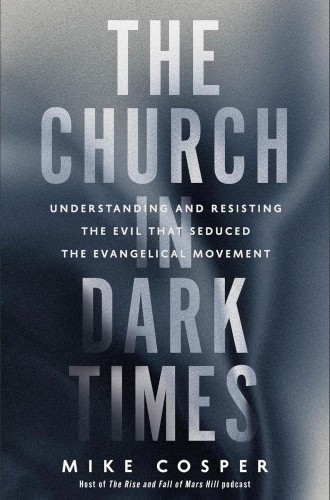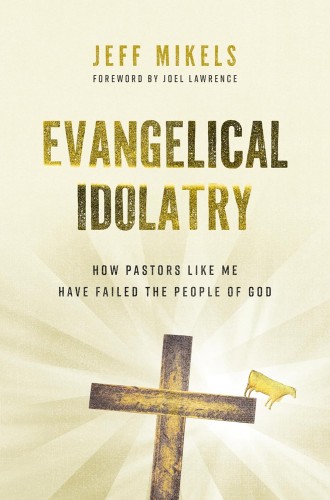Evangelical idols and ideologies
In their new books, Mike Cosper and Jeff Mikels critique evangelicalism from within. Do they go far enough?

The Church in Dark Times
Understanding and Resisting the Evil That Seduced the Evangelical Movement

Evangelical Idolatry
How Pastors Like Me Have Failed the People of God
From where does the best criticism come? I sometimes wonder about this when it comes to religious movements. For course corrections in an otherwise healthy congregation or denomination, the best critics may well be those who are still inside the machine. They have direct knowledge of the system’s problems and a strong sense of which potential changes are feasible. In my experience, however, critique from within falls flat when the problems are so insidious or harmful that something more than a course correction is called for. In these cases, a person’s continued embrace of the movement, however harsh their censures, usually betrays an inability to see the true extent of the rot.
With this principle in mind, I picked up two recent books by evangelicals critiquing evangelicalism: Mike Cosper’s The Church in Dark Times and Jeff Mikels’s Evangelical Idolatry.
Cosper’s book is based on a really cool idea. He looks to 20th-century political theorist Hannah Arendt as a guide to understanding both the evil of Nazi Germany and that of White US evangelicalism. He sagely reflects on many of Arendt’s insights and applies them to flaws in his own faith tradition. The second half of the book shifts its focus from understanding evil to resisting it, highlighting the late Eugene Peterson as an exemplar of non-evil evangelical pastoral ministry.
Read our latest issue or browse back issues.
Like I said, cool idea. But while Cosper unflinchingly uses the word evil in his critique, the examples he points to are few and thin. In the book’s introduction, he names broad categories of evil like “sexual and spiritual abuse” and a ministry philosophy in which “the ends—the growth of the church and expansion of the pastor’s influence—justify the means.” But throughout the book he keeps returning to one incident uncovered in his popular podcast, The Rise and Fall of Mars Hill, about the unfair dismissal of a church elder. In a sea of evangelical evil, Cosper’s book about evangelical evil appears to be about one starfish.
This starfish is useful to Cosper because it helps illustrate the boogeyman he identifies from start to finish as the cause of evangelicalism’s struggles: ideology. The Mars Hill church board which heartlessly discarded its elder was captive to its pastor’s ideology. It is hard to overstate how much emphasis Cosper places on ideology: “Only ideology has the gravitational force to distort the moral order of the world so dramatically,” he writes.
This totalizing blame on ideology allows evangelicalism to get a free pass on the particular evils that currently seduce it. Embodied evangelical ideology stormed the US Capitol, voted overwhelmingly for Donald Trump twice, hosted super-spreader events every Sunday at the height of the COVID pandemic, and rejoiced when Roe v. Wade was overturned. Where are these events in Cosper’s book about evangelical ideology? Nowhere, unless you count one paragraph about the rise of Trump, which Cosper feels compelled to counterbalance with another about the ideological failings of progressives. And his salvo against progressives is telling: He claims that civil rights groups’ decision to include pro-LGBTQ causes alongside their traditional work for racial equality is antithetical to their values and can only be explained by ideological zeal.
Really? Or could it be that Cosper is as ideological as the next evangelical person? To dismiss marriage equality and pro-trans justice work as fundamental departures from egalitarian ideals certainly seems to be an ideological move, by Cosper’s own definition of ideology (“what appears whenever someone claims to have a simple, all-explaining idea that can change the world”).
Indeed, sweeping but simple claims crop up throughout the book. Cosper criticizes Bill Hybels for having once said that his church, Willow Creek, was the hope of the world. For Cosper, the problem is that Hybels believed his own Willow Creek ideology rather than teaching that the universal church is the hope of the world. But Cosper’s version is also an ideological statement about religion and the cosmos. In another chapter, Cosper writes off exvangelicals (like me) who leave the tradition but try to hold on to Christian faith by claiming that they “organize around post-evangelical theologies that would lose the gospel in the efforts to save it.” The ideological hubris in this statement is staggering.
The book’s aim, I think, is best described as an attempt to motivate and equip evangelicals to resist some of the tradition’s ideologies while remaining evangelical. This is perhaps all we can expect from a critique that is decidedly from within.
My hopes were higher for Evangelical Idolatry. Jeff Mikels describes himself as a “former evangelical pastor,” which is ambiguous. Is he evangelical but no longer a pastor? A pastor but no longer evangelical? Neither?
As far as I can tell, Mikels’s current relationship with evangelicalism is never explicitly resolved, but it is clear he is no longer a pastor. The book’s introduction describes his 14-year stint as a minister, which came to an end in 2020 when he and his church could no longer navigate his aberrant views on Trump, COVID, and George Floyd. This timeline and trajectory so closely mirror my own that I thought perhaps Mikels and I were separated at birth.
Indeed, Mikels has grappled with many of the same things I have grappled with since leaving evangelical ministry. He asks, “What part did I play in training my people to think like Tucker Carlson of Fox News instead of like Jesus of Nazareth? . . . I have since come to realize that some bedrock principles of Evangelicalism are fundamentally tied to conservative cultural idols, but I never saw them or exposed them.” To convince his readers of this bedrock entwinement, Mikels structures his book into four layers: an examination of the flawed doctrinal roots of evangelicalism; a personal confession that illustrates how he lost sight of the gospel due to his theological and cultural commitments; a survey of biblical texts to discern the social responsibility of Christians today; and the naming of specific evangelical idols along with suggestions for dismantling them.
There is much to commend in this book. Mikels articulates genuine remorse for the harm done by his former ministry. The idols he identifies—which include individual responsibility, Christian supremacy, cultural conservativism, and “colorblind” ignorance of racial injustice—are important to name and work against. This list alone cuts much closer to the evangelical bone than Cosper’s abstract reflections on the nature of evil, and I suspect it owes to Mikels’s freedom from evangelical institutions. Mikels seems still to be evangelical, but unlike Cosper, he has escaped the machine.
And yet.
Mikels identifies sexual ethics as one of the tradition’s idols. He argues that evangelicals have become obsessed with sexual sin to the exclusion of almost all others, and because of what the gospel demands of us regarding human dignity in a pluralistic society, he goes so far as to advocate for marriage equality in this book. I was cheering along for some sections of this argument. But then I began to realize that he makes these arguments despite believing that queer love is indeed a sin. Then he put my doubts to rest by explicitly stating that belief, including his refusal to officiate same-sex marriages. I perhaps shouldn’t have been surprised, given how evangelical the book’s approach is, resting on arguments deeply rooted in particular readings of the Bible.
Where does this leave me with a book like this? First, I can’t recommend it to struggling evangelicals, which I otherwise would have likely done. This isn’t for dogmatic (or perhaps worse, ideological) reasons. I have seen firsthand the damage that anti-LGBTQ theology does to beloved queer believers’ souls, and I can’t participate in that kind of harm and sleep at night. Second, it makes me wonder about Mikels’s own idols. Just as Cosper’s anti-ideology screed is deeply ideological, how many idols prop up Mikels’s anti-idolatry manifesto?
I don’t know, but if I were a friend of Mikels, I would encourage him to consider the Bible’s absence—as a subject—from his idol lists. Whether we want to call it biblicism, bibliolatry, or Bible worship, an overly literalistic and authoritative view of the Bible, as if it were God in book form, seems like it should be near the top of any list of evangelical idols. Why is it conspicuously absent from Mikels’s list, and almost entirely missing from the book as a whole? I would also point him to his section on young earth creationism, in which he argues that “YEC isn’t required by Genesis 1 and 2.” This framing suggests to me that he thinks if the text were written a bit differently, it would indeed require belief in a young earth. And what then? Would we throw out the heaps of scientific evidence that point to an old earth because a particular reading of a Bible passage requires us to?
My criticism of these two books notwithstanding, I applaud both authors for their spiritual journeys and their courage to speak. It is not easy to critique a tradition you are still embedded within, whether vocationally or theologically. Books like these may help some evangelicals to begin resisting harmful ideologies or dismantling idols. I trust the authors will continue to do the same.






